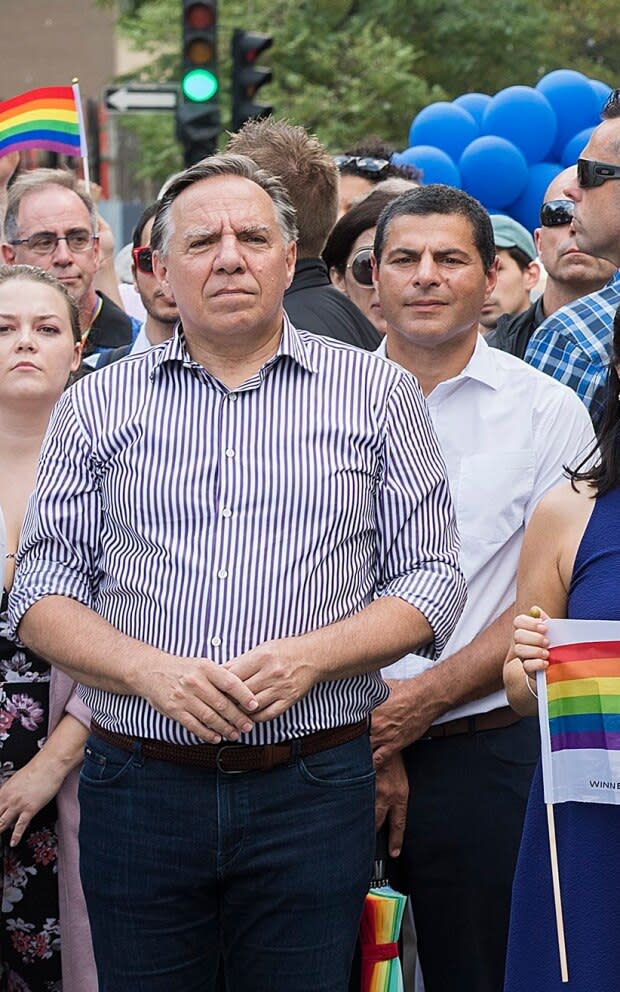Opinion: Montreal Pride has a problem with minorities, and it shows
On Oct. 20, 300 delegates meeting in Athens will vote to decide who will host World Pride 2023. Montreal Pride is vying against Sydney, Australia and Houston, Texas for that honour.
World Pride is one of the largest events in the world promoting not only LGBT rights, but also "the universal quest for freedom and human rights."
But does Montreal Pride deserve such an honour and responsibility?
As a member of the LGBT community and a future lawyer, I am disturbed to see Montreal Pride turn its back on vulnerable and marginalized groups in Quebec and around the world who need us to stand in solidarity with them.
The organization's website clearly states it aims "to support and promote local communities while serving as a beacon of hope for people around the world who continue to battle injustice."
Yet this year, Montreal Pride made a series of troubling decisions that demonstrate it has a problem with inclusion, and it has lost sight of its own mission.
First, there's the organization's decision to invite Premier François Legault to march in the parade, an event that attracted 300,000 people this year.
Many people in the LGBT community have rightly criticized this decision, given the provincial government's adoption of discriminatory legislation targeting religious minorities.
Legault should have been uninvited
As a senior CBC reporter in Quebec City in 2017, I covered the aftermath of the Quebec City mosque shooting.

I hoped, perhaps naively, that the unspeakable tragedy would lead people in power and advocacy groups to work harder to foster diversity and inclusion.
Instead, Legault's CAQ government pushed through a discriminatory law — Bill 21, which prohibits people who wear religious symbols from working in certain jobs within the public service.
Anyone who wears a kippah, a turban or a hijab is barred from becoming a teacher, a police officer or a government lawyer.
As a gesture of solidarity with all those harmed by that law, parade organizers should have uninvited Legault and anyone else from his government, as well as anyone from any party that supported the law.
This is a no-brainer.
How could Montreal Pride welcome politicians who passed legislation that violates rights protected by Quebec's and Canada's charters of rights — the foundational laws designed to protect our liberties?
The parade they were invited to march in grew out of the LGBT community's fight for equality. How is fighting discrimination against LGBT people any different from fighting the discrimination that religious minorities are now facing?
The decision by pride organizers to include Legault and members of his government in the parade disrespected the legacy of all those LGBT activists who fought for our rights.
Why not interfere in geopolitical conflicts?
Then there are the other ways Montreal Pride has contradicted its own mission.
As stories reported by CBC's Claire Loewen illustrate, Montreal Pride showed it has an inclusion problem when it fired employee Sophia Sahrane after she submitted a critical report on the organization's failure to reach out to visible minorities.
Indigenous people and people of colour are precisely the people who need to be engaged and supported by Montreal Pride.
According to a report by Egale, Canada's leading LGBT rights organization, "substantial efforts must be made to challenge the oppression of LGBT people of colour and Two-Spirited people, as people, not a collection of issues."
The organization also ejected activists fighting for democracy in Hong Kong from the parade, after organizers said police told them about a "potential attempt to sabotage the parade" by supporters of communist China.

Montreal Pride's explanation doesn't hold water: it told activists that police alerted them to a potential threat. But when CBC asked the Montreal police service (SPVM) for more details, an SPVM spokesperson said police, "did not communicate with Pride over potential threats."
So who is telling the truth?
What parade organizers told the CBC about the Hong Kong pro-democracy activists is also troubling: a spokesperson wrote that "its policy is not to interfere in geopolitical conflicts."
However, the organization's mission says it is supposed to bring awareness to global injustices.
The proposed Hong Kong legislation — now scrapped — would have allowed China to extradite Hong Kong residents to the mainland.
Mainland China remains a place where "sexual and gender minority people … still live in the shadows," facing discrimination and rejection, according to one United Nations report.

On the wrong side of history
I contacted Montreal Pride by email and phone for this piece, and no one has responded.
While other LGBT groups have no problem standing in solidarity with marginalized groups whose rights are at risk, Montreal Pride finds it difficult to stand on the right side of history.
If we do not, as a community, stand shoulder to shoulder with other marginalized people in their moment of need, how can we call on them to stand with us when our rights are at risk?
World Pride organizers should question whether Montreal Pride is as inclusive and open to diversity as it makes itself out to be and whether it is deserving of hosting such an important international event.
This column is part of CBC's Opinion section. For more information about this section, please read our FAQ.


